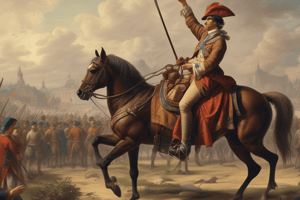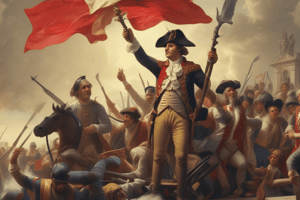Podcast
Questions and Answers
What was one of the key outcomes of the French Revolution?
What was one of the key outcomes of the French Revolution?
- Expansion of the Russian Empire
- Colonization of Africa
- Rise of the British Monarchy
- End of Feudal System (correct)
Who were the Thermidorians and what was their role in the French Revolution?
Who were the Thermidorians and what was their role in the French Revolution?
- Supporters of Napoleon Bonaparte
- Moderate reformists advocating for gradual change
- A group led by Danton and Tallien who overthrew Robespierre (correct)
- Radical revolutionaries who executed King Louis XVI
How did the French Revolution influence European politics?
How did the French Revolution influence European politics?
- It established empires in Europe
- It led to increased feudalism across Europe
- It promoted aristocratic rule in Europe
- It inspired similar revolutionary movements in other European countries (correct)
What document established rights like equality before the law and freedom of religion during the French Revolution?
What document established rights like equality before the law and freedom of religion during the French Revolution?
Who rose to power following the end of the Reign of Terror during the French Revolution?
Who rose to power following the end of the Reign of Terror during the French Revolution?
In what way did the French Revolution impact modern democracy globally?
In what way did the French Revolution impact modern democracy globally?
What was the period of radical social and political upheaval in France from 1789 until 1799 known as?
What was the period of radical social and political upheaval in France from 1789 until 1799 known as?
Which event during the French Revolution led to the fall of the Bourbon monarchy?
Which event during the French Revolution led to the fall of the Bourbon monarchy?
What were some major economic issues contributing to the French Revolution?
What were some major economic issues contributing to the French Revolution?
Which group had been systematically denied political power throughout history leading up to the French Revolution?
Which group had been systematically denied political power throughout history leading up to the French Revolution?
What event marked one of the first outbreaks of violence against state institutions during the French Revolution?
What event marked one of the first outbreaks of violence against state institutions during the French Revolution?
What ideas influenced many seeking change during the French Revolution?
What ideas influenced many seeking change during the French Revolution?
Flashcards are hidden until you start studying
Study Notes
Overview of the French Revolution
The French Revolution was a period of radical social and political upheaval in France from 1789 until 1799. It began with the Estates General calling itself the National Assembly and ultimately led to the fall of the Bourbon monarchy. The most significant events during this time included the storming of the Bastille, the Reign of Terror, and the execution of King Louis XVI.
Causes of the French Revolution
The factors contributing to the French Revolution were complex and multifaceted. Some major causes included economic issues such as high taxes combined with food shortages; political problems including bureaucratic abuses by the monarchy and the lack of representation for commoners through the Estates General. Additionally, the Enlightenment ideas influenced the minds of many people who sought change, particularly those in the Third Estate who had been systematically denied political power throughout history.
Key Events During the French Revolution
-
Storming of the Bastille: This event marked one of the first outbreaks of violence against state institutions. On July 14th, 1789, Parisians seized control over the fortress known as the Bastille, which symbolized repression under the Ancien Régime.
-
Reformation of Government Institutions: In September 1789, the National Constituent Assembly established the Declaration of the Rights of Man and Citizen, which guaranteed equality before the law, freedom of religion, and many other civil rights. They also abolished feudalism and divided France into departments and districts.
-
Social Unrest and Trial of King Louis XVI: As financial difficulties worsened, social unrest intensified, leading to increased arrests and executions. Despite this turmoil, moderate reformists like Maximilien Robespierre remained committed to their principles while others grew increasingly radical.
-
Thermidorean Reaction: After the end of the Reign of Terror, a group called the Thermidorians took power. Led by Georges Danton and Jean-Lambert Tallien, they ousted Robespierre and brought an end to the bloodiest phase of the French Revolution.
Consequences of the French Revolution
The consequences of the French Revolution were profound and far-reaching. In addition to sweeping reforms within France, it significantly impacted European politics, inspiring similar revolutions across Europe. Key outcomes included:
-
End of Feudal System: One of the primary changes after the revolution was the complete dismantling of the feudal system, replacing the old order with modern democratic government.
-
Rise of Napoleon Bonaparte: While the Revolution did not produce immediate results, it paved the way for individuals like Napoleon Bonaparte, whose military prowess eventually made him emperor and leader of France.
-
Influence on Modern Democracy: Many of the ideals espoused during the French Revolution still resonate today, having left lasting marks upon modern democracy globally.
Legacy of the French Revolution
The legacy of the French Revolution is deeply intertwined with the concepts of human rights, citizenship, and national identity. Its influence can be seen in various aspects of culture, society, and governance worldwide. From the spread of liberal thought to the establishment of new republics following its example, the revolution continues to shape our understanding of what it means to live in a free and just society.
Studying That Suits You
Use AI to generate personalized quizzes and flashcards to suit your learning preferences.




